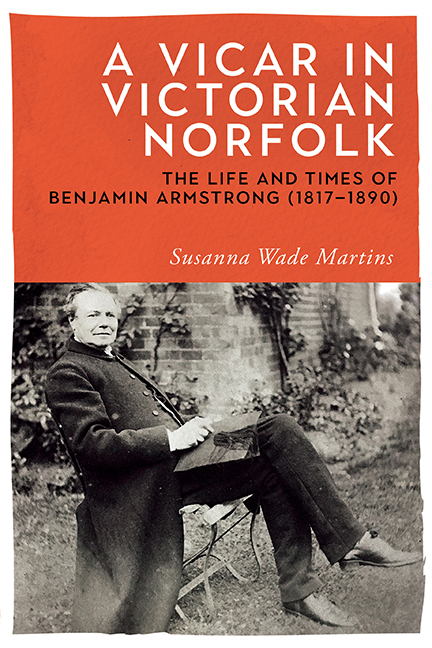Book contents
- Frontmatter
- Contents
- List of Illustrations
- Acknowledgements
- Foreword
- Author's Note
- Map
- Introduction
- I The Early Years
- 1 Early Life
- 2 The Move to Dereham
- II Public Life
- 3 The Norfolk Clergy
- 4 Church Life
- 5 The Building Legacy
- 6 Schools
- 7 Town Life
- III Family and Friends
- 8 Family Life
- 9 Friends
- IV Later Life
- 10 The Later Years
- 11 Armstrong: A Man of His Time
- Bibliography
- Timeline
- Index
4 - Church Life
Published online by Cambridge University Press: 14 August 2020
- Frontmatter
- Contents
- List of Illustrations
- Acknowledgements
- Foreword
- Author's Note
- Map
- Introduction
- I The Early Years
- 1 Early Life
- 2 The Move to Dereham
- II Public Life
- 3 The Norfolk Clergy
- 4 Church Life
- 5 The Building Legacy
- 6 Schools
- 7 Town Life
- III Family and Friends
- 8 Family Life
- 9 Friends
- IV Later Life
- 10 The Later Years
- 11 Armstrong: A Man of His Time
- Bibliography
- Timeline
- Index
Summary
The holding of a rural parish presented many opportunities and challenges for the new recruit. In the early part of Victoria's reign most were young men straight from Dublin, Oxford or Cambridge universities with very little training for the post. Many would be the best-educated inhabitants of the parish, which may have left them feeling rather isolated, and this lack of intellectual stimulation must have been frustrating. The Revd Walter Marcon followed his father as vicar of Edgefield in 1880. ‘I found life very slow and lonely.’ He missed the give and take of ordinary conversation: no one initiated an idea, instead ‘everyone waited for me to speak and then replied in monosyllables’. ‘A country parson must be able to read silence.’ When Richard Cobbold moved from the urban life of Ipswich to the rural isolation of Wortham, a parish on the Norfolk– Suffolk border, he regretted the ‘solitary confinement’ of the rural clergy, who ‘alone are compelled to spend three-quarters of the year in one parish’. When the Revd Francis Massingberd, a graduate of Magdalen College, Oxford, moved to the Lincolnshire parish of South Ormsby shortly before 1838, he had hoped to continue an academic life, but found regular study difficult in the isolation of South Lindsey: ‘great learning is now hopeless for me’. John Rashdall moved to a neighbouring parish from Trinity College, Cambridge, followed by Cheltenham, where he had a wide circle of Evangelical friends, to ‘the lonely usefulness of a country curate's life’. Armstrong sometimes records the ‘monotony of the work’, and looked forward to his six weeks’ holiday a year when he visited friends, family in London, the seaside with his family and made longer trips, often abroad, with his father. Nor was there much sense of corporate identity among the rural clergy as a whole, although this was to change over the period, especially as the railway made it easier to travel to meetings in their cathedral city and Bishop Pelham instituted regular gatherings of his clergy at his palace in Norwich.
A report to the Church Congress of 1893 stated that ‘The great disease which afflicts the country clergy is want of work.’ Books of advice aimed at young clergymen stressed the dangers of ‘becoming enamoured of a peaceable and retired life and of literary tastes’.
- Type
- Chapter
- Information
- A Vicar in Victorian NorfolkThe Life and Times of Benjamin Armstrong (1817–1890), pp. 91 - 118Publisher: Boydell & BrewerPrint publication year: 2018

